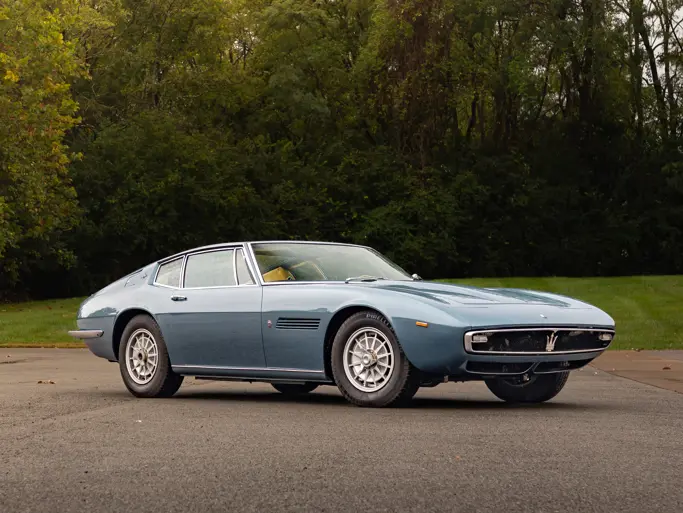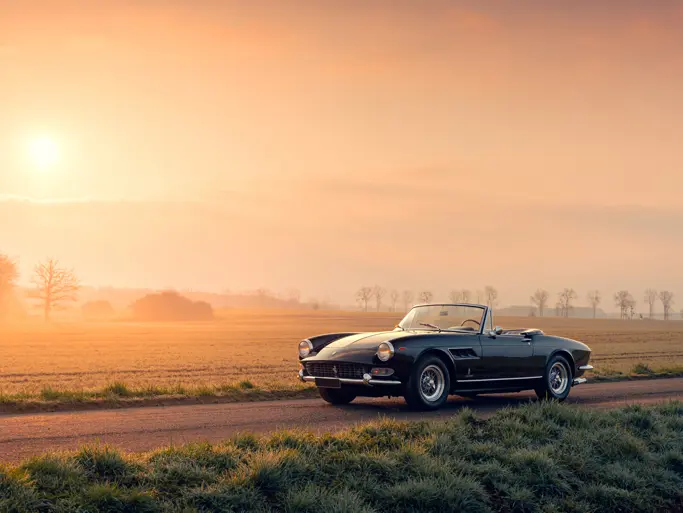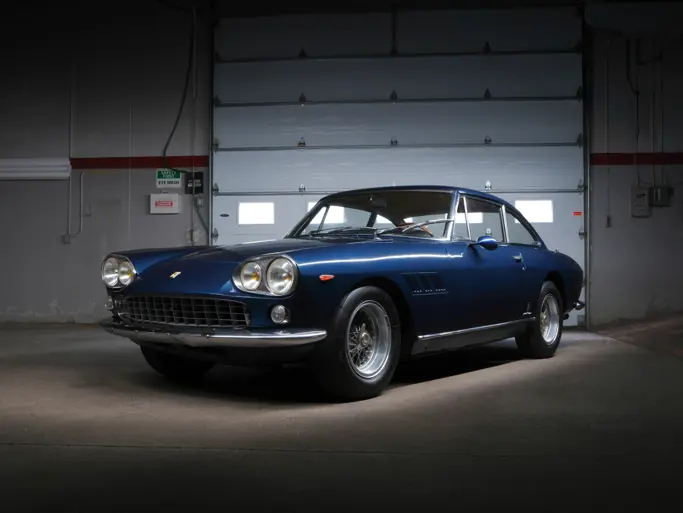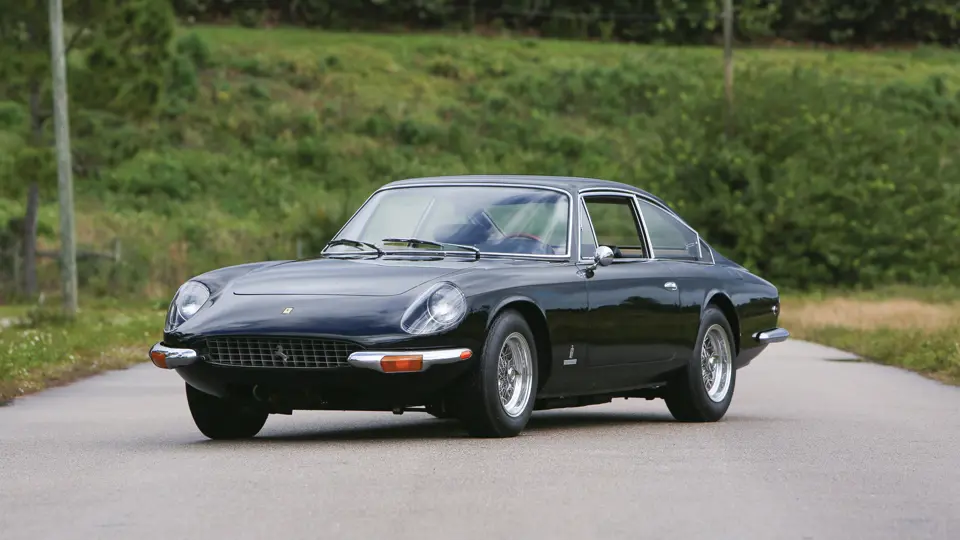
1970 Ferrari 365 GT 2+2 by Pininfarina
{{lr.item.text}}
$236,500 USD | Sold
{{bidding.lot.reserveStatusFormatted}}
- 4,390-cc, 320-hp V-12 engine
- Five-speed manual transmission
- Performance plus luxury
- Many professionally rebuilt mechanic components
- Top Ferrari mechanics have performed work
- Ferrari Classiche certification
- Covered headlights
- Toolkit
- Service records
- Borrani knock-off wire wheels
- Speed & distance in kilometers
- Only 800 built from 1968 to 1971
With many styling influences seen on the elegant Ferrari 365 California, the 365 GT 2+2 was introduced at the Paris Salon in 1967. It was the largest and most luxurious Ferrari model to date, carrying forward the increasing demand for high-speed transport with accommodations for up to four passengers.
The 1968 model year brought problems for Ferrari, as it did to all of the European manufacturers who produced cars for export to the United States. The safety regulations and stricter emission requirements made it quite difficult for the builders of high performance cars to comply.
At the time, Ferrari’s best option for the American market centered on the all-new 365 GT 2+2, the first car from Maranello to fulfill the new safety mandates. The luxury 2+2 was powered by a 4,390-cc, 320-hp V-12 engine with three Weber carburetors and was backed by a five-speed manual transmission. The 365 GT 2+2 features independent rear suspension, limited-slip differential and a hydro pneumatic leveling system; power steering and air conditioning may have been installed on at least one 500 Superfast – now these appointments were standard on the 365 GT 2+2. The wheelbase was the same as its 330 GT 2+2 predecessor, and with its luxury oriented platform weighed in as one of the heavier Ferraris produced. The claimed top speed of 152-mph was attained by the Road & Track test team for their review in the November 1969 edition.
Its low-slung fastback design was created and constructed by Pininfarina; it is noted for its smooth styling with a well-contoured front end that resembles the 365 California and a more sweeping roofline than the preceding 330 GT 2+2. It is an attractive car that carried on the subtle elegance which characterized Ferrari’s luxury offerings. The European market cars featured clear headlight fairings, but these were removed for U.S. deliveries due to the previously mentioned federal regulations. A most uncommon feature on the 365 GT 2+2 was the use of a very high strength translucent plastic to cover the turn indicator lights that are integrated into the front bumpers. Road & Track termed the car as “The Queen Mother of Ferraris.”
The Ferrari performance was combined with a luxurious interior, creating a most impressive grand tourer. Plush leather, luxurious veneered trim panels, air conditioning, a stereo, Veglia instrumentation, individualized rear seating and standard power windows completed the interior appointments. The shimmering black finish is beautifully accented by the legendary Borrani wire wheels with knock-offs, eggcrate-style grille, front hinged tilt-out rear windows; four-wheel disc brakes will handle the stopping power.
The current owner shares with us that, according to information found in Ferrari Market Letter, chassis number 13471 was purchased in 1987 by Dick McClure, a Stockton, California based collector, from Leonard Blaylock III of Houston, Texas. Mr. McClure restored the Ferrari and rebuilt the engine over the next six year with the help of Patrick Ottis, a top-notch Ferrari mechanic, and Geoff Ohland. He then showed it at Concorso Italiano and other venues plus enjoying select road rallies along the way. It has benefitted from an extensive reconditioning of entire engine and running gear during its lifetime.
The current owner has had the car since 2010 and has executed work on the Ferrari that includes the addition of the Borranis, rebuilt brake booster and clutch, acquired an original Ferrari toolkit within the proper leather roll and jack, acquired an original owner’s manual, new correct carpets (including trunk), period correct radio and the desirable headlight covers. The compressor for the air conditioning has been changed to a Japanese brand that is reported as more efficient, but the old York compressor accompanies the car. Greg Jones in Florida - also recognized as another top Ferrari mechanic and a top judge, rebuilt the transmission and corrected a problem with the clutch cable. Mr. Jones also put in correct door and trunk rubber seals and repaired the gauges so all of them work, including the clock. He also put in a new exhaust system with its correct hangers. The Ferrari has also has a rebuilt radiator that has resisted any overheating at all, even when he was testing it in Florida.
When inspecting and adjusting the valves it was noticed the cams that had been recondition many years ago where not holding up. The owner decided to install new megacycle camshafts and rocker arm bushing, pins and rollers, as well as ball-type tappet screws. While Mr. Jones was performing this work, he also painted the cam covers and air cleaner with the correct crackle finish.
The owner has enjoyed the Ferrari at his weekend home without accumulating many miles, and it has Classiche certification from Ferrari. It recently completed the Going to the Sun Rally, a 1,200 mile western rally in which “everything on it worked and performed flawlessly at high speed over 1,200 miles.” Greg Jones serviced and detailed the car after the rally, leaving it in the beautiful shape seen in the accompanying photos. This vehicle is road worthy and a great driver with service records going back to 1987.
By the time production ended in 1971, Ferrari had built approximately eight hundred 365 GT 2+2s, accounting for half of Ferrari production in its three-year run.

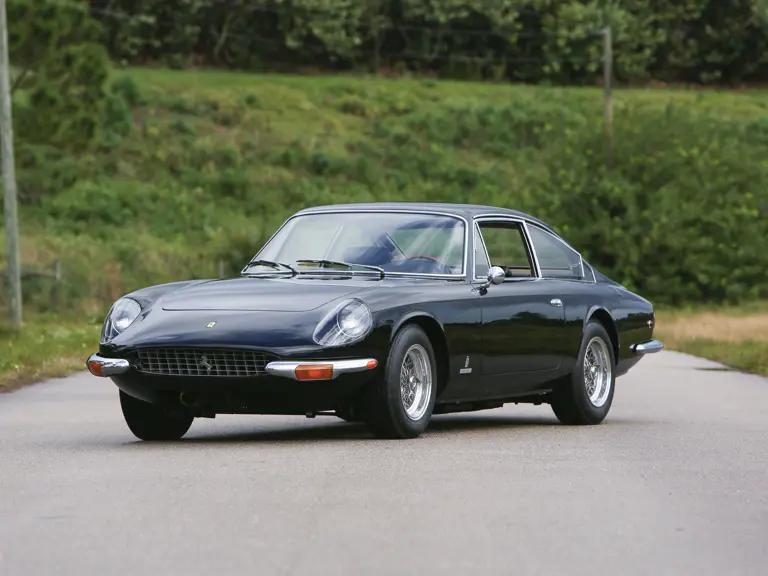
 | Fort Lauderdale, Florida
| Fort Lauderdale, Florida
